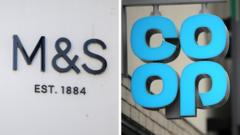Who Were the Four Arrested in the M&S and Co-op Cyber Attacks?

Understanding the Recent Cyber Attacks Targeting Major Retailers
In a troubling development, the retail sector has faced significant disruptions due to a series of cyber attacks targeting well-known brands like Marks & Spencer (M&S) and the Co-op. These attacks have not only compromised customer and employee data but have also raised questions about cybersecurity measures in place within these organizations. The arrests of four individuals linked to these incidents mark a pivotal moment in the ongoing investigation. This article delves into the details of these cyber attacks, the implications for the affected retailers, and the broader context of cybersecurity threats facing businesses today.
Overview of the Cyber Attacks
Beginning in mid-April, the cyber attacks launched against M&S and the Co-op have led to serious operational challenges. The attacks involved sophisticated techniques aimed at breaching security systems, stealing sensitive data, and deploying ransomware to hold the companies' IT infrastructures hostage.
The Impact on Retail Operations
The effects of these cyber attacks have been far-reaching:
- Operational Disruption: M&S has reported that its operations may be affected until late July, with some critical IT systems not expected to be fully operational until October or November.
- Financial Losses: M&S estimates a staggering £300 million in lost profits due to these disruptions.
- Data Breaches: Both retailers faced significant breaches of private data belonging to millions of customers and employees, raising concerns over identity theft and privacy violations.
The Arrests and Investigation
The National Crime Agency (NCA) has made significant progress in its investigation by arresting four individuals believed to be involved in the cyber attacks. The arrested individuals include a 20-year-old woman from Staffordshire and three males aged between 17 and 19, apprehended in London and the West Midlands.
Charges Against the Suspects
These arrests were made on several serious charges, including:
- Violations of the Computer Misuse Act: Engaging in unauthorized access and usage of computer systems.
- Blackmail: Attempting to extort money from the companies by threatening further attacks.
- Money Laundering: Financial transactions linked to the proceeds of illegal activities.
- Participation in Organized Crime: Being part of a group engaged in criminal activities.
Details of the Attacks
The cyber attacks employed sophisticated methods, including ransomware, which scrambled the companies' IT networks, rendering them inoperable unless a ransom was paid. This malicious software is a common tactic among cybercriminals, designed to extort money from organizations by threatening to publish or destroy sensitive data.
Initial Breach of M&S
The first breach occurred at M&S, where hackers stole a vast amount of sensitive data. Reports indicate that the criminals sent a threatening email to the M&S CEO, demanding payment to restore access to the compromised systems.
Subsequent Attack on the Co-op
Shortly after the M&S breach, the Co-op faced a similar attack. The criminals accessed the private data of millions of customers and staff members, further compounding the crisis in the retail sector. The Co-op was forced to publicly admit the breach after hackers contacted media outlets with proof of the attack, indicating that the situation was more severe than the retailer had initially conveyed.
Response from Retailers
Both M&S and the Co-op have taken steps to mitigate the damage caused by these cyber attacks. The Co-op, in a proactive measure, disconnected its IT networks from the internet to prevent further access by the attackers. Similarly, Harrods announced that it had also been targeted but managed to avoid significant disruptions by implementing similar security measures.
Long-term Implications for Cybersecurity
The rising frequency and sophistication of cyber attacks against major corporations highlight the urgent need for enhanced cybersecurity measures across all sectors. Companies must invest in robust security systems, employee training, and incident response strategies to safeguard against potential future attacks.
What Can Businesses Do to Protect Themselves?
With the landscape of cyber threats constantly evolving, businesses must remain vigilant and proactive in their cybersecurity efforts. Here are some essential strategies organizations can implement:
- Regular Security Audits: Conduct routine assessments of IT systems to identify vulnerabilities and address them promptly.
- Employee Training: Educate staff about cybersecurity best practices, including recognizing phishing attempts and implementing strong password policies.
- Incident Response Plans: Develop and regularly update incident response plans to ensure swift action can be taken in the event of a cyber attack.
- Two-Factor Authentication: Implement two-factor authentication to add an extra layer of security for accessing sensitive systems.
- Data Encryption: Utilize encryption for storing and transmitting sensitive data to protect it from unauthorized access.
The Future of Cybersecurity in Retail
The recent cyber attacks on M&S and the Co-op serve as a stark reminder of the vulnerabilities that exist even within well-established organizations. As technology continues to advance, so too do the tactics employed by cybercriminals. The retail sector must adapt by strengthening its cybersecurity posture and fostering a culture of security awareness among employees.
The Role of Law Enforcement
Law enforcement agencies, like the National Crime Agency, play a crucial role in combating cybercrime. Their ongoing investigations and arrests signal to potential criminals that the consequences of engaging in such activities can be severe. Partnerships between law enforcement and businesses will be critical in developing effective strategies to combat cyber threats.
Conclusion
The cyber attacks affecting M&S and the Co-op illustrate the significant risks businesses face in the digital age. As companies continue to adapt to an increasingly digital world, the emphasis on cybersecurity must remain a top priority to protect sensitive data and maintain customer trust. The recent arrests mark a step towards accountability, but the journey toward a more secure future is ongoing.
As businesses reflect on these events, they should consider their own cybersecurity measures. Are you confident in your organization's ability to withstand a cyber attack? The time to act is now.
Frequently Asked Questions
What is ransomware, and how does it affect businesses?
Ransomware is a type of malicious software that encrypts a victim's files, making them inaccessible until a ransom is paid. It can cause significant operational disruptions and financial losses for businesses.
How can companies improve their cybersecurity?
Companies can enhance their cybersecurity by conducting regular security audits, providing employee training, implementing two-factor authentication, and developing incident response plans.
What should I do if I am a victim of a cyber attack?
If your organization is targeted by a cyber attack, immediately activate your incident response plan, notify law enforcement, assess the damage, and communicate transparently with affected parties.
In light of these events, how prepared do you think your business is to handle a cyber attack? #CyberSecurity #DataProtection #RetailSafety
Published: 2025-07-10 11:02:03 | Category: technology



